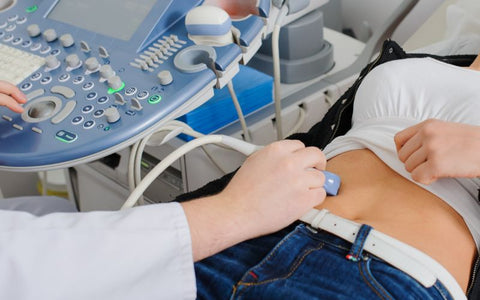
Symptoms of ectopic pregnancy and what to do
Ectopic pregnancy is rare, affecting 0.8-1% of pregnancies. However, it is extremely dangerous for the mother's life, so we must definitely address this issue.
In an ectopic pregnancy, the embryo implants outside the uterus, not in the uterus. In 98% of cases, it attaches to the fallopian tube and begins to develop there. It is also possible for it to attach to the ovary or the abdominal cavity. It is also dangerous if the implantation occurs in the cervix.
In all such cases, similar symptoms are possible as in a normal pregnancy, but other signs may also be associated with it. Let's first look at the specific symptoms, then what to do. Finally, we will consider how to reduce the chances, what are the predisposing factors.
Symptoms of ectopic pregnancy
In this case, pregnancy begins essentially similarly to normal pregnancy, so it is not so easy to determine at the beginning.
Does a pregnancy test detect an ectopic pregnancy?
This question often arises, well, the answer is: yes, it clearly shows . So based on this, we cannot decide anything yet. The embryo in this case produces the HCG hormone, which the test will indicate.
As you can read in the summary of the signs of normal pregnancy (link to the blog article on this in the underlined anchor text) : menstruation is missed, mood swings, breast tenderness, and nausea may also occur.
However, there are some signs that may be suspicious, but we can only know for sure after a medical examination. Therefore, if you experience any of the following, do not panic, but definitely consult a doctor immediately, because an ectopic pregnancy needs to be treated urgently.
The following symptoms may indicate an ectopic pregnancy:
- Brownish, coffee-ground-like bleeding (this can also occur due to miscarriage)
- Severe, stabbing lower abdominal pain that may radiate to the shoulders and rectum: Dull lower abdominal pain is also possible during a normal pregnancy as your uterus grows and “makes room” for itself. But if these pains are sharp, you should seek medical attention immediately.
- Low blood pressure, dizziness, feeling of weakness, and in extreme cases fainting: in case of fainting, urgent hospital examination is required.

If any of the above applies to you, or you have had an ectopic pregnancy, see a doctor as soon as possible after a positive pregnancy test, don't wait until the 6th week!
Normally, ultrasounds are often only performed around the 6th week, but in this case, we cannot postpone seeing a doctor.
An early examination is also necessary if there are factors that may predispose to an ectopic pregnancy, for example: you have used an internal contraceptive device (e.g. an IUD), you have had pelvic inflammatory disease or surgery, or you have endometriosis.
If the problem is detected at the very beginning, it is still possible to choose a gentle treatment, so subsequent pregnancies are more likely to be problem-free.
This is how they can show it
If, in the event of a positive pregnancy test, the doctor finds no signs of life in the uterus after 2 weeks, then there is a strong suspicion that the embryo must be searched for outside the uterus. If it is not visible in the fallopian tube, if it cannot be found with an ultrasound in the first round, then a laboratory test is necessary. Obstetrician-gynecologist Dr. Andrea Sipos said that in such cases, the HCG level is checked every two days. In the case of a normal pregnancy, the amount of HCG in the blood doubles every two days. In the case of an ectopic pregnancy, it also increases, but at a slower rate.
If the tests confirm that it is indeed an ectopic pregnancy, then in the beginning it can be treated without surgery: they can stop cell division with medication.

Types of ectopic pregnancy
We can group the different cases according to where the embryo attaches, as follows:
- Tubal pregnancy: this is the most common, in which case the implantation occurs in the fallopian tube. Normally, the embryo travels from the fallopian tube to the uterus within 5-7 days. In this case, a sheath protects it from implantation, which breaks down after 5-7 days. If the fallopian tube is scarred or too thin, there is a greater chance that the embryo will get stuck, and after the protective sheath breaks down, it will remain in the tube and implant.
- Ectopic pregnancy in the abdominal cavity: in this case, the embryo finds a place in the abdominal cavity. There have been cases where the baby was able to develop, but the chances of this are minimal. An abdominal pregnancy is also a life-threatening condition.
- Cervical pregnancy: this ends in miscarriage in most cases, but if the embryo implants a little closer to the uterus, it can continue to develop, which is also dangerous.
- Ovarian ectopic pregnancy: In this case, the fertilized egg remains in the ovary and begins to develop there. It may be indicated by lower abdominal pain, abnormal bleeding, and a corpus luteum cyst.
This is what to do in case of an ectopic pregnancy
Sometimes the cells die and are absorbed on their own. In this case, only follow-up tests are needed. However, if they do not, and the embryo starts to develop, it can cause damage to the fallopian tube (or where it is implanted) that can lead to severe internal bleeding. This is life-threatening for the mother. Therefore, treatment must be started as soon as possible.
If the receptionist tries to shake you down when you make an appointment, feel free to be pushy: mention that you suspect an ectopic pregnancy.
If it can still be resolved, the doctor will recommend medication.
In more advanced cases, surgery is helpful. If it is not too urgent, it will probably be done laparoscopically to cause as little trauma as possible. If possible, the fallopian tube will be left intact, but in many cases it will also have to be removed.
If the other fallopian tube is intact, you still have a chance of getting pregnant naturally later.
If the situation is urgent, if we are talking about internal bleeding, then immediate abdominal surgery will be necessary. In this case, you should know that you can still have a healthy baby afterwards. For example, Dér Heni told her story during an interview. It is quite sad and shocking, but know that there is more to it: Heni has since given birth to two children.
The question may arise as to how to prevent ectopic pregnancy. However, to do so, let's learn about the predisposing factors!
Possible causes of ectopic pregnancy
For example, you may increase the likelihood of developing the problem by:
- Pelvic inflammatory disease due to infections or sexually transmitted diseases: in this case, scars can form in the fallopian tubes, which can hinder the migration of the embryo.
- Previously used internal contraceptive devices, such as an IUD
- Genetically caused abnormality, thinner fallopian tube
- Previous ectopic pregnancy
- Artificial insemination
- Smoking: we generally avoid this when planning a baby, as it seriously endangers the health of both the baby and the mother, even in the event of a normal pregnancy.
It is important to know that these are all just predisposing factors, so the occurrence of ectopic pregnancy is rare in these cases.
Can it be prevented?
If we look at the above reasons, we can see that the likelihood of developing an ectopic pregnancy can be somewhat reduced.
Pelvic inflammatory disease occurs less frequently with responsible sexual life, proper protection, and a monogamous lifestyle.
You can also reduce the chances by choosing a different device instead of an IUD.
Before planning a baby, be sure to consult your doctor, who can provide you with personalized advice for prevention and prepare you for a problem-free pregnancy.

Whatever happened or is happening to you now, numerous stories prove that there is more to it, and your next pregnancy can be problem-free.
































